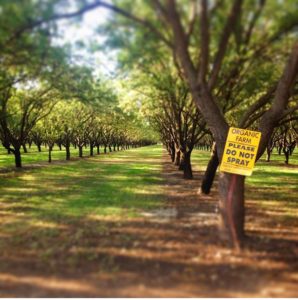
Posted on : August 9th, 2018
 There once was a time when organic food was the same as “food.” Nowadays, the label “organic” is a special one. It requires USDA certification and strict adherence to not only sustainable organic farming practices but also regulates how a product is produced and stored. Products labeled “100% Organic” cannot be made or allowed to be in contact with any food source that is not also certified organic. You should also know that it costs money to apply for and maintain certified organic status.
There once was a time when organic food was the same as “food.” Nowadays, the label “organic” is a special one. It requires USDA certification and strict adherence to not only sustainable organic farming practices but also regulates how a product is produced and stored. Products labeled “100% Organic” cannot be made or allowed to be in contact with any food source that is not also certified organic. You should also know that it costs money to apply for and maintain certified organic status.
That has added additional costs and resulted, for a time, in organic produce being relegated to health food or other alternative “specialty” food markets. That’s because food production in the United States was largely taken over by mega-food production enterprises that grew to be dependent on pesticides and chemical fertilizers to maintain the highest level of yields. And, certainly, family farming has not been immune to that. But today organic food —real food made without synthetic chemicals or GMO manipulation—has made a striking comeback. People care deeply about what they and their children are eating, and most people care about the health of the planet, too!
But, certified organic products cost more money to produce and, therefore, to buy, and you can’t legally say that a product is organic anymore without that label. So the question naturally arises: is organic food actually healthier for you?
According to the Mayo Clinic, studies have shown small to moderate increases in some nutrients in organic produce. The most significant increases are in certain types of flavonoids, which have antioxidant properties. Almonds happen contain these flavonoids. They scavenge free radicals that damage our bodies and make us age. Antioxidants in almonds are associated with a lower risk of Alzheimer’s Disease, some types of cancer and heart disease.
Organic produce also has significantly lower amounts of pesticide residue. (Some slight pesticide residue still occurs on occasion because of airborne pesticides from conventional farms.) But are pesticides bad for you? The maximum levels of residue allowed on conventional produce are supposedly safe for general consumption. But do these regulations take into consideration the amount of pesticide-contaminated food eaten over a lifetime? Do we know what it does when it accumulates in our bodies, in the fish we might eat that are affected by water runoff from pesticide laden fields, how it affects the balance of micro-organisms in our guts and how that affects our immune systems, how it affects fertility, how it affects babies or fetuses in the womb, or what might it have to do with more and more people developing food allergies or sensitivities? We do know the answer to many of these concerns. On some level, it’s common sense! It’s not good for us as family farmers and it’s not good for you!
 We care about that! At Maisie Jane’s we have always had a strong commitment to provide healthy food whether everything we produce is labeled “certified organic” or just “natural.” For us the word “natural” means no chemicals, no synthetics, and nothing from a lab. But we also provide products that are certified “organic” and say so on the label.
We care about that! At Maisie Jane’s we have always had a strong commitment to provide healthy food whether everything we produce is labeled “certified organic” or just “natural.” For us the word “natural” means no chemicals, no synthetics, and nothing from a lab. But we also provide products that are certified “organic” and say so on the label.
Maisie Jane’s California Sunshine Products, Inc. was founded on strong beliefs and passion for offering unique, flavorful, top-quality, nut products. We strongly believe in earth-friendly practices that start on our family owned and operated orchards. We use Organic farming practices and continue in the process by using all-natural ingredients with no preservatives or GMOs. We believe in honest, friendly and helpful customer relations at all levels. We take pride in every task, every day, with every person.